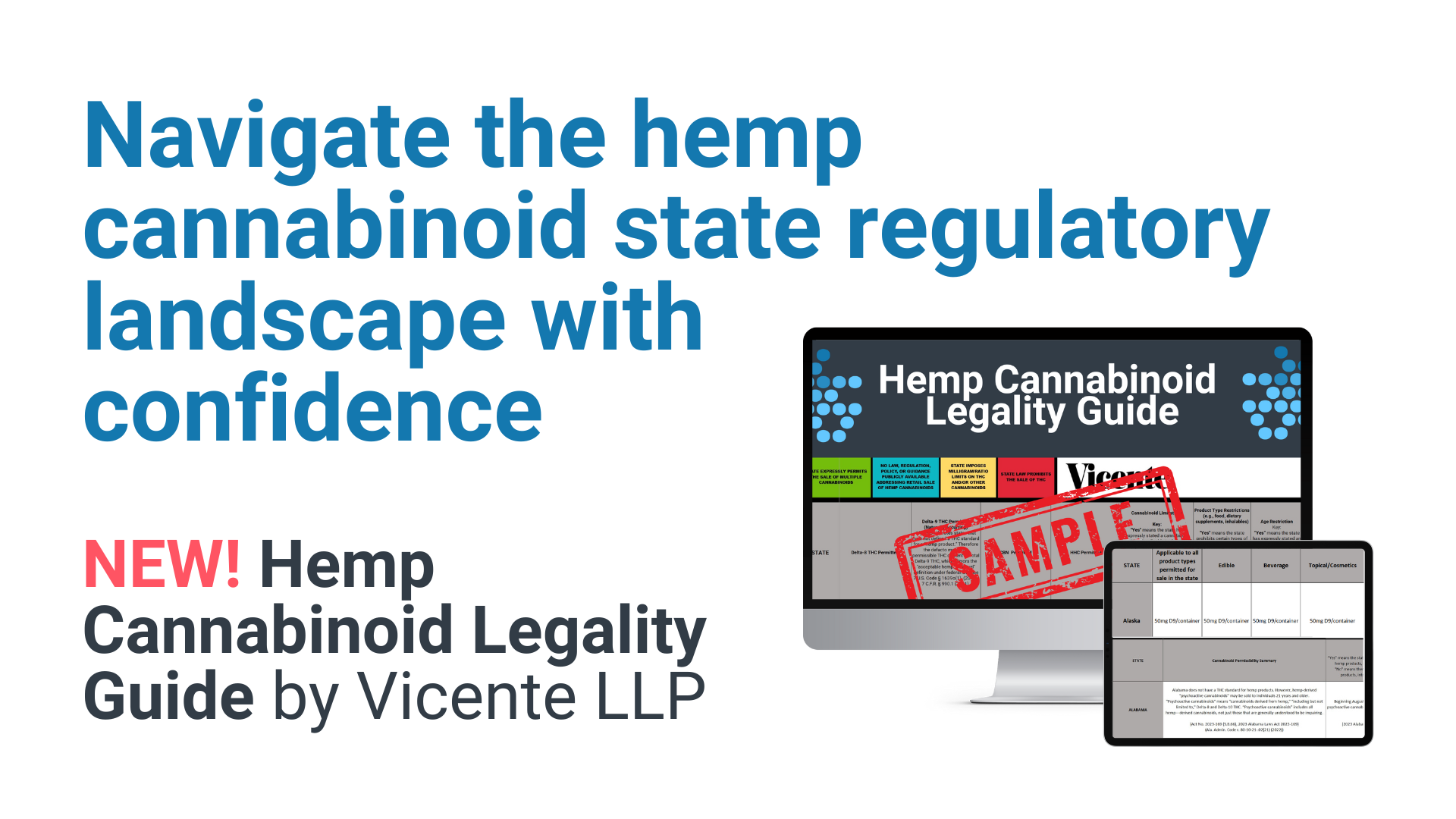Coronavirus and Cannabis: Physical Distancing Guide for Cannabis Businesses
By Alex Lamphier
Mar 20, 2020
This VS Insight focuses on physical distancing guidelines cannabis businesses can follow to stem the spread of the new coronavirus (COVID-19). For additional insights and state-specific updates, see our main post on the subject, "Coronavirus and Cannabis: Monitoring the Impact."
The COVID-19 crisis is constantly evolving and so is its impact on cannabis businesses nationwide. With each state responding to the situation in a different manner and creating novel issues as emergency orders interact with established laws and regulations, the Vicente Sederberg team has been working diligently to stay on top of the latest developments so that we may continue to provide industry-leading service to our clients.
As a result of the recommendations of various state and federal agencies, cannabis operators across the country are taking proactive measures to assure patients, customers, regulators and other constituents that they are taking appropriate steps to ensure, preserve and promote public health. The following is a non-exhaustive list of steps that cannabis operators may consider implementing, to the extent possible, to encourage physical distancing in an effort to reduce the potential for the virus to spread through the cannabis community:
Reducing Person-to-Person Interaction
-
Consider moving to preorder and pick-up only, or conducting retail sales by appointment. Patrons can place orders or reserve an appointment via an online platform or by phone. For pick-up orders, have patrons book pick-up times (and encourage them to only show up at the scheduled time) to further limit the number of individuals at the dispensary, as well as to control the flow of visits to reduce the potential for bottlenecking, which elevates the potential for exposure.
-
In the event a line forms, whether inside or outside of the dispensary, utilize space indicators (chalk, tape, or stations) that are placed six feet apart to provide patrons with a guide as to how to follow best public health practices while in a queue. As an alternative to having patrons wait in lines, patrons could wait in their vehicles and queueing notifications could be communicated via text.
-
Where allowable, consider implementing curbside pick-up for preorders.
-
Cannabis delivery businesses should consider working together with other cannabis operators on promoting their delivery services to encourage patrons to avoid traveling to and congregating at retail establishments. To the extent practicable, cannabis delivery outfits should consider expanding the geographic scope of their services.
-
Consider utilizing a door attendant at entries and exits to mitigate patient exposure to the facility’s most commonly touched points. Where permissible, inspect IDs visually by having patrons hold them up for presentation to security personnel in lieu of handling patron identification.
-
Remind patrons of maximum purchasing limits, and consider promotions that encourage and incentivize patrons to purchase larger quantities in an effort to reduce the frequency of individual visits.
-
Consider implementing specific hours for at-risk populations, in particular seniors, veterans and those suffering from respiratory disorders and immunodeficiencies.
-
Limit the number of employees in the facility to a skeleton crew capable of safe and effective operations.
Sanitation and Hygiene
-
Discourage patrons from using cash as a form of payment, and implement tap-and-pay technology where possible.
-
Remove all handheld menus, tablets, and iPads used at the facility. Menus can be displayed on TVs and other large-format visual media, and patrons should be encouraged to view product menus from their own phones or handheld devices- QR codes linked to the product menu can be posted in various locations within the dispensary for ease of access.
-
Eliminate the use of aroma jars and promote pre-packaged products as opposed to deli-style service wherever possible. Encourage patrons to avoid the direct sharing of products and to keep personal accessories clean.
-
Increase the frequency of cleaning and sanitization of the entire facility, including door handles, floors, bathrooms, common areas, ATMs, handheld devices, and all counters and surfaces. It is strongly recommended to sanitize payment pads and counters in between each sales transaction, and other points of common contact should be cleaned at least every half hour. To further minimize exposure at the point-of-sale, place markers on the floor to encourage patrons to stay a few steps away and refrain from touching the counter.
-
Ensure there is an adequate supply of hand sanitizer available for all employees and patrons, and put hand sanitizer in conspicuous locations throughout the facility, particularly at entries and exits, to encourage frequent hand washing.
-
Require all agents to wear gloves while handling consumer identification materials and all forms of payment. Gloves should be changed after each interaction. Encourage patrons to use their own pens for items requiring a signature, and consider alternatives to public pens.
-
Consider possible adjustments or alterations to HVAC systems to increase ventilation throughout the facility, and consider implementing physical barriers to separate patrons from agents, such as sneeze guards or teller-style windows.
-
Emphasize that agents should be staying home when sick, following respiratory etiquette (covering coughs and sneezes), and practicing good hand hygiene with reminders placed liberally throughout the facility.
If you have questions about how to best position your cannabis business in response to the COVID-19 outbreak, please feel free to reach out to our team.

